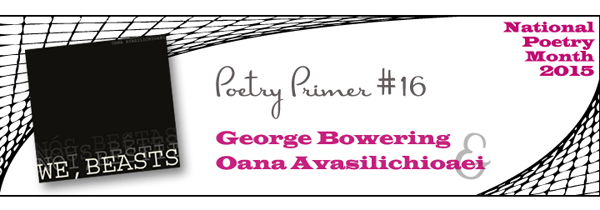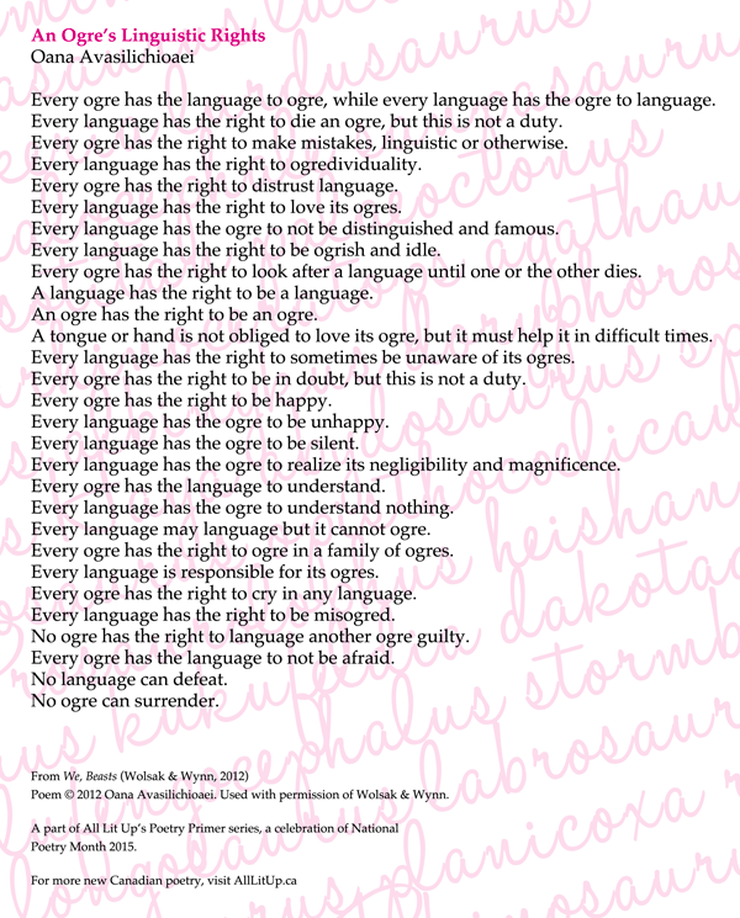|
The Rusty Toque is pleased to cross-post selections from the All Lit Up blog's Poetry Month series Poetry Primer in which poets from across the country select their favourite up-and-coming poets. Visit the All Lit Up blog for this and other Poetry Month treats! Like all good things, eventually National Poetry Month must come to an end for another year. But we couldn't end our Poetry Primer series without a big finish, so here it is: George Bowering, winner of the Governor General's Award for both poetry and fiction, Canada's first Poet Laureate, and an Officer of the Orders of both British Columbia and Canada, is our final senior poet to choose an emerging voice he feels will make an impact on the Canadian poetry community. The co-founder of the poetry journal, Tish, and the author of over 100 books, Bowering's latest collection, The World, I Guess, has just been released from New Star Books. As the author of over 100 books, selecting an emerging voice was a relative process for Bowering and he selected Montreal poet Oana Avasilichioaei. With many translation projects under her belt, including Universal Bureau of Copyrights and The Thought House of Philippa (both from BookThug), Avasilichioaei has published a few poetry titles of her own: Abandon, feria: a poempark, and We, Beasts, all published by Wolsak & Wynn. She continues to strengthen her poetic voice with the release of her latest collection, Limbinal, from Talonbooks. Read on for a poem from her We, Beasts collection and an original poem on why she writes poetry! * * * George Bowering on why he selected Oana Avasilichioaei, or Poly Oana craquer: Each morning the first thing I do is to read some poetry before going downstairs to the daily paper’s prose. A lot of the books I have tried lately do not dis-resemble the latter enough. But the work (and play) of Oana Avasilichioaei has raised my hope for the future of our art. We do not really need poems that tell us what the poet saw and how he can make figurative language to give us his view of those things. We do not really need language that is passed over the counter by its baker. Ms Avasilichioaei is environed by language as she is by any world she enters, and when you read you don’t read her version—you are too busy negotiating the pleasant difficulty of her pages. If you run into one another from time? Well, what a nice thing to experience first thing in the morning. This poet offers no Frostian conclusions, but possibilities leading in all directions. Judith FitzGerald was right when she wrote that you can’t really read the poems, but you can sure experience them--and if you do not want poetry to lull you, you will want that experience. Oana Avasilichoaei on why she writes poetry & who her influences are (in an original poem!):
Why I Write or Why I Write the Long Poem or A Longpoem Minifesto The long poem is traversed because to speak across the gutter is urgent, necessary. The long poem because one page is too small a movement. The long poem insists that I build its narrative, then break its narrative. The long poem forms an architecture inviting one to listen to its corners, edges, valleys, boundaries, cornices, stairwells. The long poem thrusts typography into topography. The long poem is graphically alert. The long poem has its own notion of time and motion through differently each time. The long poem presents the past into the future of now. The long poem is my conviction that I will remain unconvinced. The long poem sings, blurts, screams, demands, pleads, cries, bites its lip, sticks out its tongue, swallows, grits its teeth. The long poem leaps to another long poem lapping on the shore of another long poem longing to lick the pointy interruptions of another long poem. The long poem can’t help asking itself “when am I long enough to be a long poem?”. The long poem because the serial, the series, the sequence, the sequential join and, in joining, unlock, accumulate, spill over. The long poem becomes a book of long poems since the long poem is untamed, brutish, feral. The long poem is in charge and knows it. The long poem is its own charge. The long poem agitates the sentence, possibly misspells it, leads it astray. The long poem disobeys the rule of the unilingual and tries to speak in tongues. The long poem disobeys the rule of the univocal attempting to exceed the page to new tonalities. The long poem is its own ecosystem yet open to myriad articulations of influence, voices intersecting to resonate its alertness, its eccentricity, its flow. The long poem is a creature and, like all creatures, somewhat vain, meaning the long poem is a survivalist. The long poem won’t back down until it grows into the long poem, though it brakes down, dawdles, dithers, almost drowns. The long poem aspires to be a revolutionary, yet knows this is unlikely. The long poem is promiscuous. The long poem is faithful only to the long poem, which is not to say that the long poem is narcissistic. The long poem might delve into a nature though the long poem is not natural. The long poem is shifty, unsettled, inherently nomadic. In the end, the long poem lengthens longing, end to end, to no end, unending. * * * That's it! We hope you enjoyed our Poetry Primer in celebration of National Poetry Month, whether you were already a poetry lover or a new poetry reader. You can always take the whole collection home, including poems from our established poets, with our anthology, ibid. What won't be around forever is the opportunity to get our ALU merch, so pick up any buttons, magnetic poetry, shirts, or bags before the end of the day. |
RUSTY RECOMMENDS
In the spirit of supporting writing—especially writing that's off the radar or under appreciated—we want to know what you are excited about reading and what you think we should be reading. Your recommendations should be paragraph length (approximately 250 to 300 words) and should briefly summarize the book and detail why you are recommending it or why you think others should read it. Send our reviews editor Aaron Schneider your recommendations of Canadian and International fiction and poetry. Please write "Rusty Recommends" in the subject line. Include your (250 to 300 word) recommendation, name, and a link to your website, blog, or social media site (if you have one). Selected recommendations will be posted on our website. We will contact you if your recommendation is selected for publication. There is no payment for publication of Rusty Recommends. Archives
July 2015
Categories
All
Rusty Recommends Editor:
Dr. Aaron Schneider completed a PhD. in Canadian Literature at Western University where he currently teaches courses in public speaking, political rhetoric and Canadian Literature. He is excited about bringing together his interests in World and Canadian Literature. He is the co-founder and co-editor of The Rusty Toque and Western's online student journal Occasus. |



 RSS Feed
RSS Feed
